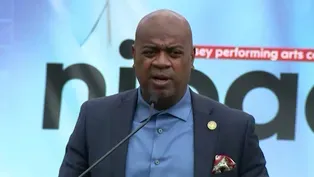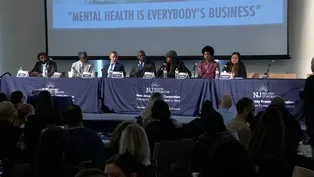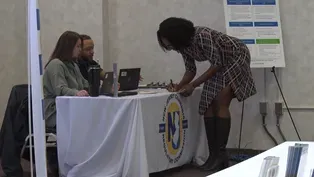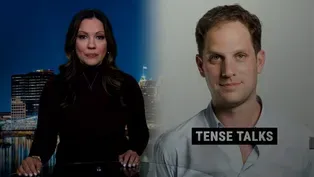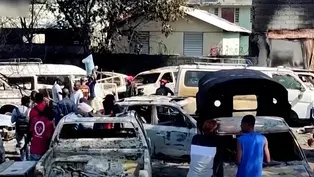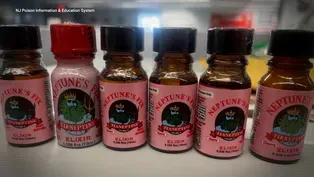NJ Spotlight News
NJ Spotlight News: March 28, 2024
3/28/2024 | 26m 46sVideo has Closed Captions
Watch as the NJ Spotlight News team breaks down today’s top stories.
We bring you what’s relevant and important in New Jersey news, along with our insight. Watch as the NJ Spotlight News team breaks down today’s top stories.
Problems with Closed Captions? Closed Captioning Feedback
Problems with Closed Captions? Closed Captioning Feedback
NJ Spotlight News is a local public television program presented by THIRTEEN PBS
NJ Spotlight News
NJ Spotlight News: March 28, 2024
3/28/2024 | 26m 46sVideo has Closed Captions
We bring you what’s relevant and important in New Jersey news, along with our insight. Watch as the NJ Spotlight News team breaks down today’s top stories.
Problems with Closed Captions? Closed Captioning Feedback
How to Watch NJ Spotlight News
NJ Spotlight News is available to stream on pbs.org and the free PBS App, available on iPhone, Apple TV, Android TV, Android smartphones, Amazon Fire TV, Amazon Fire Tablet, Roku, Samsung Smart TV, and Vizio.
Providing Support for PBS.org
Learn Moreabout PBS online sponsorship>> Major funding for NJ Spotlight News is provided in part by NJM Insurance Group, serving the needs of residents and businesses for more than 100 years.
And the PSEG foundation.
Briana: Tonight, the mental health crisis is unfolding behind bars.
Advocates say the state's incarcerated have a desperate need for mental health services.
>> About two and five people incarcerated have a history of mental illness.
37% in state and federal prisons, about 44% in local jails.
Briana: Plus, sounding the alarm.
Congressman Frank Pallone and poison control regulators talking about gas station heroin.
>> It is killing people.
It is highly addictive.
It is not an opiate but has the same impact.
Briana: Governor Murphy breaks his silence on the war in Gaza, calling for an immediate cease-fire.
And almost one year since New Jersey native Evan was detained while reporting in Russia, Tencent talks for his release continue.
>> That may extend his pretrial again.
It may actually start the actual trial and that might make it harder to conduct the negotiations.
So, to my mind, I will take this as a positive and we will keep working to try to find that solution over the next 90 days.
Briana: NJ Spotlight News begins right now.
♪ >> From NJ PBS Studios, this is NJ Spotlight News.
Briana: Good evening and thank you for joining us this Thursday night.
Americans are dealing with more mental health crises than ever recorded in the history of our nation.
According to data from the Bureau of Justice statistics, more than half of offenders in state prisons across the country report having mental health problems, but just one in four get the professional help they need behind bars.
Mental health is the focus of this year's annual New Jersey conference, the state's largest nonprofit that helps remove barriers to implement for citizens returning from jail or prison.
The agency argues more needs to be done to divert those with mental health problems away from incarceration and towards the right treatment and support, making this an issue that should be in everyone's interest.
David Cruz reports.
>> Violence, crime, incarceration -- one leads to the other, all exacerbated by poverty and the lack of access to health care, education and employment opportunities.
The common thread we are not collectively coming to understand his mental illness and the impact it has.
Does it seem like we are understanding more or acknowledging more the role that mental health crises play in all of these things?
>> I think we are beginning to understand the role of mental health, to go to your point, much more acutely but not interfering or providing diagnosis at the earliest possible time.
Not providing treatment and the tools.
We understand more from an intellectual perspective, but institutions are still operating the same.
David: In front of a full house at St. Peter's University, academics, social workers, health care providers and clients with the New Jersey reentry Corporation listened to panel discussions that included formerly incarcerated individuals sharing experiences and identifying the challenge they all face to just function in difficult times.
>> About 2 million times each year, people with serious mental illness are booked into jail.
2 million.
Nearly one in four people shot and killed by police officers between 2015 and 2020 had a mental health condition.
About two in five who are incarcerated have a history of mental illness.
37% in state and federal prisons, and about 44% in local jails.
>> When you have someone who has a mental health issue and they are being treated with violence, their souls become broken and you get a monster when you come out into our society.
Now, it is our families being harmed.
>> It was different for me.
I shut down, I was angry.
I was fighting for my life.
So, I didn't go in there to meet new people.
I didn't go in there to mind anyone else's business because I didn't take a plea.
I had to fight for me, so different.
I didn't know my mental was in a dark place because I was angry.
I was disconnected.
David: This is the 10th reentry conference, coming off a year that saw police involved killings of Andrew Washington in Jersey City.
It is also a period where the state has expanded efforts like arrive together which bears mental health crisis specialists with police.
It is not a perfect program but it is at least a realization that not every confrontation requires a nightsticks potion -- nightsticks solution.
Have we had enough time to figure out the impact these programs are having?
>> It clearly works, but we have to understand the importance of having mental health providers to be part of the solution and that is our goal, to understand the importance of diagnosis earlier, treatment earlier, providing individuals the tools and educating the public.
David: But it is a slow walk to universal understanding of all the factors involved in what separates the safe and sound, from the troubled and incarcerated.
For Jim McGreevey, it is a daily grind and conferences like this one serve to measure how far his program has come and how far it still needs to go.
I'm David Cruz, NJ Spotlight News.
Briana: It is promoted as a mood booster and focus aid.
Sold at gas stations, smoke shops and convenience stores, but the CDC is warning the public to stay away from the dangerous substance known as gas station heroin, most recently marketed under the name Neptune's Fix.
Sold in colorful bottles that mimic some of the effects of opioids and can have serious, life-threatening side effects.
Ted Goldberg reports.
Ted: Congressman Frank Pallone and health care providers are warning people that supplements can lead to serious consequences.
>> Low broad pressure, seizures and even cardiac arrest.
>> It is one of the most recent unregulated product that is too easily available under the guise of being harmless, some harmless mood and cognitive booster that is sold as gas station heroin.
Ted: Gas station heroin is sold under brand names like Neptune's Fix, which has been recalled by its manufacturer.
You can still find it at convenience stores, smoke shops and gas stations.
>> It's killing people.
It is highly addictive.
It is not an opiate, but it has the same impact.
>> It is addictive.
It results in users ending up in our emergency rooms.
Because of the significant side effects of withdrawal, many users develop a tolerance.
>> They use these products every day in escalating doses, trying to keep the effects the same.
Ted: In other countries, you can find it in prescription medication but it was never approved for use in American drugs.
The problem is what it is itself.
>> You might get way too much, effectively giving you an overdose or you might get it and a bunch of other things that have side effects or can be dangerous like synthetic.
Ted: It has become much more widespread thanks to baseless claims.
>> The claims being made are that it treats anxiety, all kinds of disorders.
Some claims have even been made that it can be used as an alternative to heroin or opiates as a method of treatment almost.
People just believe all this stuff.
>> We normally hear the word of about once or twice a year at the New Jersey poison center.
Over the space about two to three weeks in June, we heard about it six times from six patients.
That six patients in June has now become 40 patients as of today.
Ted: Despite the recall, some places still stock these drinks.
Pallone has written to federal regulars asking to step up enforcement and asked trade groups to tell the member stores to stop selling anything with it.
>> There so many things sold today that people just believe because it's on the shelf, that somehow it is safe or it's been approved by the FDA or somebody.
The police will not seize this at the convenience store.
That is just not going to happen.
It is not like heroin or something else that is controlled substance.
Ted: Tianeptine has been banned in nine states and leaders are not taking any chances.
I'm Ted Goldberg.
Briana: Newark Mayor Ras Baraka is catching heat over campaign finance issues, stemming from his most recent run for reelection.
Failed to report more than $700,000 in donations and spending, according to a new complaint from the state election law enforcement commission.
Baraka, and all but one of the city Council candidates also won their faces.
He recently paid a hefty fines for violations related to his first campaign for mayor.
Now could be staring down more penalties, tens of thousands of dollars' worth.
The complaint comes as he is ramping up his next campaign to become New Jersey Governor.
He added that he believes deeply in government transparency.
Governor Murphy, a staunch supporter of Israel, is now calling for an immediate and sustained cease-fire in Gaza in exchange for the release of the remaining hostages being held by Hamas.
He joins a growing list of elected officials who have taken that stance.
Murphy says he supported the Biden administration's efforts to get more humanitarian aid into Gaza, adding he shares the pain of Palestinians in New Jersey or mourning the loss of innocent love ones who have died in Gaza due to this conflict.
Murphy's statement is not sitting well with prominent Arab and Muslim groups throughout New Jersey who say the call for a cease-fire comes too late and fails to name Israel's actions as the cause of their suffering.
The head of New Jersey's chapter of the Council on Arab Islamic relations called it an empty gesture of support.
Estimating New Jersey's Palestinian community has had nearly 3000 family members killed in the conflict.
Haiti is once again facing a wave of chaos fueled by ongoing gang wars that broke out at the end of February leading to thousands of deaths and injuries.
Members of a newly formed transitional presidential counsel responsible for selecting the new prime minister issued their first official statement this week, vowing to restore public and democratic order.
New Jersey is home to one of the largest Haitian-American populations in the U.S. and members of the community tell Melissa Rose Cooper that the ongoing military and crisis has been distraught.
>> Brings tears to my eyes because we look at the history of the country, the first black nation to gain independence, to see after 220 years for us to be where we are today.
Melissa: He's heartbroken by was happening in his beloved Haiti.
A spike and gang violence as they stormed the country's two biggest prisons, releasing more than 4000 inmates, closing the airport and creating chaos in the Caribbean nation.
>> Kids have not been able to go to school.
Business people have not been able to go with their lives.
You have a lot of people who are sick who cannot get to the doctors, cannot go to the hospital.
>> Haiti has been suffering like this for many years, being a natural disaster, political turmoil, dating back to the 1700s.
We have been struggling with political instability for a very long time.
It is not new to Haiti.
The people are resilient and they will come back from this.
However, we are at a point where we have not seen it in a very long time.
Melissa: Stanley is the Executive Director and cofounder of NJ for Haiti.
The coalition provides support and resources to those living in Haiti and in New Jersey which is home to one of the largest Haitian American communities in the country.
>> We put out a statement a couple weeks ago in regards to really speaking on the discourse that's been taking place, calling for all actors and parties involved to cease the gang violence and really come to a term where they can come together for a concerted effort to establish peace and stability.
Too many lives have been lost.
I think what we might have to do in the states is continually advocate and make sure we provide the necessary education for the people in the states to know what they need to do in order to help and provide support.
Melissa: Haiti has not had legislative elections since 2019.
Earlier this month, the country's prime minister agreed to a transitional presidential council, but many Haitians believe having outsiders decide what is best for the country is even more problematic.
>> I believe this has contributed to the problem we have because that has not been Haitian lead efforts to resolve its own issues, indigenous issues that are taking place.
I think Haiti has been forced to take a second role as far as governance, leadership because Haiti has been on the receiving end from the United States and other countries.
>> It is a Haitian issue which requires a Haitian led solution.
As the children of diaspora, we must continue to work together to effect in a positive manner our brothers and sisters in Haiti.
We cannot do that unless we are united.
We must be strong, we must be vigilant.
Melissa: A united front of the Haitian community hopes will soon restore peace back at home.
I'm Melissa Rose Cooper.
Briana: This week, the global fight to free Evan hits a new and somber milestone.
One year since the Wall Street Journal reporter and New Jersey native was wrongfully detained in Russia while on assignment, and accused of espionage.
A Russian court on Tuesday extended his pretrial detention for the fifth time, holding him in prison for three more months until at least June 30.
The Wall Street Journal newsroom this week held a 24 hour read-a-thon to mark the grim date.
Colleagues read passages of his reporting allowed to keep his story and their hope that he will return home alive.
Roger Carson's is the U.S. this eventual Envoy -- special presidential Envoy for hostage affairs and joins me now.
Thank you for coming back on the show.
As we look at this one-year anniversary of Evan's detainment, what can you share with us about where negotiations stand for his release?
Roger: Thanks for having me back.
It is a real tragedy that Evan has been held for this amount of time, the one-year anniversary.
We had a chance to talk to the family quite often.
We talked to Paul Welland's family quite often.
It is a personal tragedy for these families.
Today is kind of a big day that it's been one year since Evan has been detained, and the families are going through their own personal hell, this personal tragedy on a daily basis.
In terms of where the negotiation is, I cannot really get into the details because it is not helpful to negotiate in public, but I can tell you we did put a strong offer out to the Russians last year and the Russians rejected it.
Since that, we've been trying to work with partners and allies to bring together a proposal that United States can deliver and we believe the Russians will accept.
That hard work goes on pretty much daily.
Briana: How much did the death of Opposition leader Alexei Navalny complicate some of these discussions?
Because there were interviews with Russian president Vladimir Putin where his name was mentioned publicly as part of a potential swap.
Did that shift the course that he needed to take?
Roger: I would ask the same question if I was in your chair.
From my chair, he does not help to get into the details of this.
While it is absolutely tragic, if anything, I feel for the Navalny family.
At the end of the day, we don't have the luxury of quitting, stopping, or even pausing.
Regardless of what happens, our office, the office of the White House, the president and Jake Sullivan and his team, we are going to keep pushing forward to find something that makes sense.
In terms of the actual details that might have been surrounding Navalny and his role in any of this, it is not helpful in me and trying to get Paul and Evan back to talk about the details.
Briana: We have seen the court extend his pretrial detention for the fifth time.
Is that typical playbook we see happen in a Russian court?
You mentioned Paul who has been detained for several years.
Mark Vogel is another name that comes to mind, an American who is detained.
Does Russia tend to draw this out to gain more leverage?
Roger: They tend to draw it out.
What they are trying to do, it is hard to get into the mindset and the people we negotiate with.
I can say everyone has pretty much gone through a year of extensions in their pretrial detention, so it is not necessarily unusual.
What I can say is if the Russians extended Evan by another 90 days, I will have to take a look at that as a positive sign.
That gives us 90 days to keep working to come up with some sort of solution.
Granted, 90 days, they may extend his pretrial again.
Alternatively, it may start the actual trial and that might make it harder to conduct negotiations.
To my mind, I will take this as a positive and we will keep working to try to find that solution over the next 90 days.
Briana: Is there any scenario where he could be released before a sentencing or be acquitted?
Roger: There always is.
In other words, even if it try process were to start, I think the Russians have the ability to either speed up the trial, end the trial.
In a way, I can say we have more flex ability than we otherwise might have.
Having said that, in doing this job for about four years, you find the people that we negotiate with -- whether that be the Russians or people in other countries, once an actual trial starts, they like to finish the trial process.
If that takes 3, 6, 9, 14 months, that might be a period we are not able to progress in the negotiations.
While that is not a hard and fast rule, that is the way we tend to look at based on the evidence we've gathered over four years.
It is to our advantage to solve this sooner rather than later anyway.
Briana: Buying a little bit of time there.
Roger Carstens the U.S. special envoy for hostage affairs.
Thanks for your time.
Join us tomorrow night for a special edition of NJ Spotlight News, as we already noted, tomorrow marks the one-year anniversary of New Jersey native Evan, who was detained.
We take you to Princeton where he grew up, talk to people who knew him, including some of his closest friends with an update on his detention and potential release.
That is Friday night right here on NJ PBS.
In our spotlight on business report, protecting patient access to medical marijuana.
The state cannabis regulatory commission is kicking up a series of in-person clinics across New Jersey to help patients and caregivers sign up for new their enrollment with the medicinal cannabis program.
Holding events in Newark, Trenton and Atlantic City, it all comes as a number of medical marijuana patients has been declining while recreational numbers go up.
>> We have exclusive lines, faster lines for faster service.
We also have the benefit of no state taxes.
>> Those are some of the benefits of having a medical cannabis card with the cannabis revelatory commission, or CRC.
Cardholders also have access to all medical dispensaries in the state and can purchase three times more candidates per month than recreational users.
>> Folks can register in person as long as they have a qualifying condition and prescription.
They can get their card here.
They can also renew.
Caregivers could also be enrolled in our system and they can leave today with a $10 physical card or predigital card.
>> The in person registration clinics started last year as a trial and that CRC found many that prefer to be in person or struggle with the technology of applying or renewing online.
People like you disabled combat veteran.
>> Renewing my medical marijuana card, that is what I came here today for.
I couldn't do it online.
I had a problem uploading my ID.
Quick, easy, fast.
>> There are seniors, folks with disabilities that cannot just get across the finish line when it comes to completing the registration, even though we have an excellent customer service team that is very patient and talks to folks on the phone.
They still let us know they want to come in person.
>> The CRC is looking to continue these in person clinics to expand their outreach but also want to expand with physicians.
>> We want to continue to expand our medical practitioners that are enrolled in this service, that really Center patient access and believe in the health benefits of the cannabis plant.
But, issues we are finding are the high fees that doctors are charging in order to see patients to get into the medical cannabis industry.
>> Only about 1500 of the state's 20,000 doctors are currently participating in the program as one of the reasons for those high costs.
>> It is not that patients are not getting access to the medicine, they are, but they find it is less expensive for them to go to the adult use program where they don't have to pay the physician fees to join the program and get access to the medicine.
>> Is there concern that perhaps physicians are taking advantage of this moment and need?
>> Absolutely.
I believe physicians are taking advantage of this program.
Physicians often charge up to $200 and require cash payments for these visits.
And the original intent of the medical marijuana legislation was that physicians would simply certify that a patient has a qualifying condition and that is all they have to do.
Not that they had to keep seeing them routinely, periodically and charge fees for them to be continuing with the involvement in the program.
>> I think it is still expensive.
That is why the black market is still in effect today because you can buy for half the price on the black market that states are charging for so the prices are way too high.
>> How much are you spending a month?
>> It depends how much you buy a month.
You could spend a couple hundred a month or much more.
>> For all those who do want to get the cannabis legally and through the medical cannabis program, more in person clinics will be held quarterly in Newark, Trenton, and Atlantic City.
I'm Joanna Gagis, NJ Spotlight news.
Briana: On Wall Street, stocks were studied to end this shortened trading week.
Markets are wrapping up the best first-quarter performance in five years.
Here's today's closing trading numbers.
♪ And that will do it for us tonight, but don't forget to download the NJ Spotlight News podcast so you can listen anytime.
I'm Briana Vannozzi.
For the entire NJ Spotlight News team, thank you for being with us.
Have a great evening.
We will see you back here tomorrow night.
>> New Jersey education Association, making public schools great for every child.
And RWJBarnabas Health, let's be healthy together.
♪
Baraka slate failed to report $700K, watchdog says
Video has Closed Captions
Newark mayor says reporting problems were the fault of an outside firm (1m 10s)
Mental health needs are focus of reentry conference
Video has Closed Captions
Jim McGreevey says there’s more understanding but not enough action (4m 31s)
New clinics launched to boost medical marijuana
Video has Closed Captions
Enrollment in NJ has declined as recreational market opened up (4m 14s)
Russia extends detention of WSJ reporter Evan Gershkovich
Video has Closed Captions
Interview: Roger Carstens, US Special Presidential Envoy for Hostage Affairs (5m 39s)
Turmoil in Haiti, community in NJ watches in anguish
Video has Closed Captions
New Jersey is home to one of the largest Haitian American communities (4m 12s)
Warning to steer clear of 'gas station heroin'
Video has Closed Captions
Tianeptine has been linked to overdoses, emergency room visits (3m 37s)
Providing Support for PBS.org
Learn Moreabout PBS online sponsorshipSupport for PBS provided by:
NJ Spotlight News is a local public television program presented by THIRTEEN PBS
